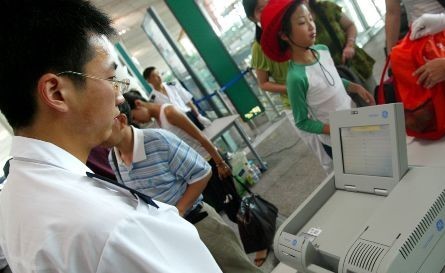In the wake of the bus explosion case in Yunnan Province, Beijing security departments have also intensified security checks at bus stations and on public vehicles.
Airports in Beijing and other Olympic co-host cities adopted dual security checks from July 20 and passengers are required to show their IDs to buy bus, train and ship tickets to these cities. The police have set up checkpoints along the highways in and out of Beijing.
 Airport security inspection upgraded
Airport security inspection upgraded
The police also announced awards ranging from 10,000 to 500,000 yuan (1,449 to 72,463 U.S. dollars) for people providing useful tips to stop serious crimes during the Games.
A liquid ban was introduced in April on carry-on baggage on domestic flights and the postal service has suspended accepting parcels containing liquids from June till Oct. 31.
Identity cards are required and the contents of mail -- except letters -- are unpacked and checked before mailing.
In addition, state-level anti-terrorist drills were launched to prepare the security forces against chemical attacks, hijacking and other possible contingencies.
Beijing has deployed nearly 110,000 personnel -- including police, army troops and volunteers -- and mobilized the public to ensure the security of the Games.
Special forces such as an army air unit, an engineering force and chemical defense troops will join the mission.
Combat aircraft, helicopters, warships, missiles, chemical defense equipment and radar would be used in case of security threats.
On July 17, the country even issued a manual to teach citizens how to discover possible terrorist attacks, to identify suspicious substances such as bombs and how to take proper actions in face of such attacks and minimize damages.
These security measures followed the experience of previous host cities of the Olympics, according to Liu Shaowu.
"The Olympic Games are a large-scale sports event such as we've never experienced ... With a huge number of people coming to China, international terrorist forces are seeking chances. Therefore, we have to intensify security efforts," Liu said.
The massacre during the 1972 Summer Olympics in Munich resulted in the death of 11 Israeli athletes and coaches, and a bombing on July 27, 1996 in Atlanta at the Centennial Olympic Park killed two people and injured 111.
According to Ma Zhenchuan, another top security official with the Olympics organizing committee, the Eastern Turkistan Islamic Movement (ETIM) poses a real threat to the Beijing Olympics.
"It's not imaginary. We have been focusing on the ETIM and it has been labeled a terrorist group not only by our country, but also the international community," said Ma, adding that investigations showed it has been plotting terror attacks on venues.
"We'll pay attention and try our best to make the Games safe and peaceful," Liu said.
(Xinhua News Agency July 24, 2008)